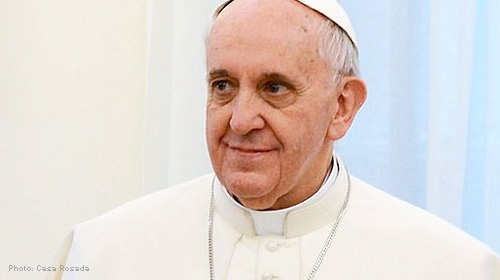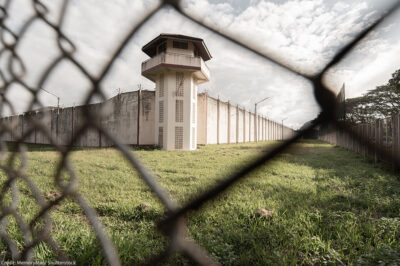New Pope Washes the Feet of 12 Kids in Prison: An Easter Reminder for the U.S.


Last week, while Christians around the world were preparing to celebrate Easter, the newly elected Pope Francis visited Casal Del Marmo, a youth detention facility in northwest Rome. To celebrate the traditional Holy Thursday Mass, the Pope washed the feet of 12 young prisoners.
Though popes traditionally wash the feet of 12 persons during the Holy Thursday service, Francis' decision to celebrate the mass at a prison marked a significant departure from previous popes who had elected to hold the event at the traditional venue of the St. John Lateran Basilica – a papal property near Vatican City. In a homily earlier that day, Francis emphasized the importance of serving those whom society has forgotten:
We need to go out . . . to the outskirts where there is suffering, bloodshed, blindness that longs for sight and prisoners in thrall to many evil masters.
Though Francis' words came from across the Atlantic, they resonate loudly within the United States, one of the world's leading incarcerators of children. Almost 71,000 youth are incarcerated in juvenile detention facilities and prisons across the United States – the overwhelming majority for non-violent offenses. While most are confined in facilities specifically for juveniles, many are held in adult correctional facilities. In each of the last five years, more than 90,000 kids under age 18 were held in jails and prisons across the United States.
While in adult facilities, youth may be subject to various forms of physical and sexual abuse from adult prisoners, as well as correctional officers. They may also be subject to the cruel and inhumane practice of solitary confinement, which requires that the child be confined alone to a small cell for 22-24 hours a day with virtually no access to the outside world or human interaction. Even in adults, solitary confinement can exacerbate short- and long-term mental health problems, or make them more likely to occur.
As the U.S. Supreme Court has recognized, some punishments may be particularly inappropriate for juveniles. This is especially the case with solitary confinement. Many juveniles are neither able to understand the purpose of this punitive practice or to cope with the stresses that result from it. As one former young prisoner described the experience:
The only thing left to do is go crazy – just sit and talk to the walls. A lot of people in here go on [suicide watch]. . . See they say it's to make you better, but it really didn't change me, it just gave me a worser attitude.
Some states are moving to end solitary confinement, a practice seen as a human rights violation by the international community. For example, the Florida legislature began considering a bill that would impose significant limitations on the use of solitary confinement in Florida jails and prisons; however, solitary confinement of juveniles remains largely unregulated.
After the service, Francis personally greeted all 46 persons incarcerated in the facility. "Do not let yourselves be robbed of hope," he told the young prisoners before leaving. For many youth incarcerated across America, maintaining hope constitutes a daily challenge. However, restricting the use of solitary confinement against them may provide at least some.
Learn more about youth in solitary confinement and other civil liberty issues: Sign up for breaking news alerts, follow us on Twitter, and like us on Facebook.




